Welcome to this special presentation on uncovering your family’s story. I’m Robin R. Foster, and I’m so glad you’re here. Whether you’re just beginning your journey or returning to it with new eyes, this time we share together will help you connect with your ancestors in ways that are meaningful, empowering, and often deeply spiritual. We’ll walk through tools, strategies, and sacred practices that can help you discover names, stories, and legacies that deserve to be remembered. You might encounter hard history, and at times you may need to pause—but know this: you are not alone. I will be here to guide you, and the spirit of those who came before us will walk with us. Together, we will honor the past and carry its light into the future.
Please don’t forget to show me a little love down at the end.
Thank you for joining us for Uncovering Our Roots.
(00:00:04):
It's a journey through African American History, Part 1.
(00:00:08):
We're exploring family history through records, memory, and historical context.
(00:00:15):
I'm Robin R. Foster.
(00:00:17):
My email is robinfoster at genealogyjustask.com You can join me at Substack and
(00:00:28):
it's at genealogyjustask.substack.com
(00:00:30):
I hope for you to be able to be successful in uncovering your family's history.
(00:00:40):
When you work with me, you're not alone.
(00:00:42):
We will walk through this journey together.
(00:00:45):
At times, you may encounter painful or difficult truths.
(00:00:50):
If you need to step back, that's okay.
(00:00:53):
I'll still be here.
(00:00:54):
You might need to ask for clarification or have a task shown in greater detail.
(00:01:01):
That's exactly what I'm here for.
(00:01:04):
The gift I bring to this work is a spirit that guides me,
(00:01:08):
helping us find what's been hidden,
(00:01:11):
lost,
(00:01:12):
or forgotten.
(00:01:13):
That same spirit will lead you to what you are seeking.
(00:01:20):
Start with what you know.
(00:01:23):
Begin with yourself.
(00:01:25):
Write down your full name, your birth date, and birthplace.
(00:01:31):
Then add your parents, grandparents, and as far back as you can go for memory.
(00:01:38):
Use family stories and keepsakes.
(00:01:41):
Ask yourself, what stories did I grow up hearing?
(00:01:45):
What names were repeated at family reunions?
(00:01:50):
on old letters.
(00:01:52):
Are there photos, Bibles, or papers in the family?
(00:01:58):
Do I have oral history?
(00:02:02):
Laying the foundation.
(00:02:04):
Interviewing family.
(00:02:06):
Prepare before you ask.
(00:02:09):
Choose relatives.
(00:02:10):
Bring a recorder or notebook.
(00:02:13):
Ask open-ended questions.
(00:02:16):
Encourage storytelling, not just facts.
(00:02:21):
Start with the easy stuff.
(00:02:23):
Build trust with joyful or simple memories.
(00:02:28):
Be respectful of emotion.
(00:02:30):
Allow space if the topic becomes painful.
(00:02:36):
Listen more than you talk.
(00:02:39):
Silence can invite powerful memories.
(00:02:44):
Follow the threads.
(00:02:45):
Small details often lead to big discoveries.
(00:02:50):
Preserve the interview.
(00:02:53):
Save, transcribe, and share the stories you gather together.
(00:03:00):
Every family elder is a walking archive.
(00:03:04):
When their voice is gone, your story can still live on.
etails are withheld.
(00:03:12):
Lead with patience and compassion.
(00:03:16):
Respect their silence and try again gently later.
(00:03:21):
Ask open-ended questions.
(00:03:23):
Stories often emerge naturally.
(00:03:27):
Look for clues in what is shared.
(00:03:30):
Even small comments can lead to big discoveries.
(00:03:35):
Use records to fill the gaps.
(00:03:38):
Census, obituaries, deeds, military files often hold keys.
(00:03:45):
Accept the journey.
(00:03:47):
Truth unfolds with its own time.
(00:03:51):
Return with love, not pressure.
(00:03:54):
Show you're here to honor, not to judge.
(00:03:59):
Keep listening.
(00:04:00):
Silence today may become sharing tomorrow.
(00:04:05):
Keep your ears, eyes, and spirit open.
(00:04:10):
The story may come when the time is right, and I'll be here to help you put the pieces together.
(00:04:16):
Now you're ready for building the tree.
(00:04:21):
All the links that you see on this page will be down below in the blog post.
(00:04:29):
The first thing you want to do is to use FamilySearch.org.
(00:04:35):
It will always be free.
(00:04:40):
You can create your tree there.
(00:04:46):
Another thing is a timeline.
(00:04:50):
You always want to use timelines effectively.
(00:04:55):
Forming research questions.
(00:04:58):
Choose one ancestor to research.
(00:05:04):
A census tracker and sources.
(00:05:10):
Extract and confirm all the information.
(00:05:15):
Telling the story.
(00:05:17):
That's combining the facts
(00:05:19):
with the family voices, adding photos, audio, and interviews.
(00:05:29):
Those are what we call Memories.
(00:05:32):
And there's a link to that in the blog post.
(00:05:36):
Honoring both ordinary and extraordinary.
(00:05:36):
Honoring both ordinary and extraordinary.
(00:05:45):
America's Historical Context.
(00:05:49):
You'll learn about enslavement,
(00:05:52):
military service,
(00:05:54):
reconstruction,
(00:05:56):
voting,
(00:05:57):
access to education,
(00:06:00):
the Jim Crow era,
(00:06:02):
civil rights,
(00:06:03):
and more.
(00:06:04):
Part two of this course will cover what happened before enslavement.
(00:06:11):
There are a lot of records out there.
(00:06:15):
These are some core genealogy records.
(00:06:20):
The U.S.
(00:06:21):
Census.
(00:06:25):
You need to know what records to use to get past the 1870 wall.
(00:06:32):
Obituaries.
(00:06:34):
Newspapers.
(00:06:36):
Military records.
(00:06:38):
Social Security applications.
(00:06:41):
Death certificates.
(00:06:43):
Wills.
(00:06:44):
Probate.
(00:06:46):
Marriage and church records.
(00:06:48):
Deeds.
(00:06:49):
plantations, and more.
(00:06:52):
The records online and offline.
(00:06:58):
All you need to know to find all those records is the Research Wiki.
(00:07:04):
It's free.
(00:07:08):
What you need to know is the place where your ancestor was living.
(00:07:18):
All you need to know to find available historical records is a place where your ancestor lived.
(00:07:26):
County or parish and state.
(00:07:30):
And you would go to the research wiki.
(00:07:35):
For example, you can put in the search field Richland County, South Carolina.
(00:07:41):
Press enter and you get a page full of genealogy resources.
(00:07:48):
Another thing that you can get to on the wiki is African American resources by state.
(00:07:59):
The research wiki also has African American resources by state.
(00:08:04):
Search for African American resources for and put the state in.
(00:08:12):
Then press enter to get the resources for that state.
(00:08:17):
Why you want to go back through what you have?
(00:08:20):
That's often a question that new people ask.
(00:08:26):
Well, you may have missed something.
(00:08:29):
Small clues often hold the biggest answers.
(00:08:34):
You're now more experienced.
(00:08:36):
New eyes catch what old eyes miss.
(00:08:41):
Connections take time.
(00:08:44):
Past details make sense with present knowledge.
(00:08:49):
Old documents offer new clues.
(00:08:52):
A name or phrase may now have a new meaning.
(00:08:56):
Gaps are easier to spot.
(00:08:58):
You can now ask better, more focused questions.
(00:09:03):
If you build a stronger foundation, revisiting helps you tell the story more clearly.
(00:09:03):
Sometimes the breakthrough
(00:09:12):
isn't in a new record.
(00:09:16):
I'm excited to tell you about this new tool at FamilySearch.
(00:09:24):
This is digging deeper.
(00:09:27):
A full text search lets you search for any word or phrase anywhere in a digitized
(00:09:34):
document,
(00:09:35):
not just the names or dates that have been indexed.
(00:09:39):
Think of it like searching inside a book.
(00:09:42):
Instead of just getting the index in the back,
(00:09:45):
you're flipping through every page to see where your ancestor might show up in a
(00:09:51):
deed,
(00:09:51):
a court case,
(00:09:53):
a tax record,
(00:09:55):
or a newspaper notice.
(00:09:58):
The link will be in the blog post.
(00:10:02):
It'll be Full-Text Search.
(00:10:08):
Closing Reflections.
(00:10:13):
Why does this work matter?
(00:10:16):
This work matters because it's a sacred calling to remember those who came before us.
(00:10:22):
As we uncover their names and stories,
(00:10:25):
we honor their spirits,
(00:10:27):
and in doing so,
(00:10:28):
we find ourselves.
(00:10:33):
Encouragement to continue.
(00:10:35):
Even when the path feels slow or the answers are hidden, trust that you can seek
(00:10:43):
what is seeking you to.
(00:10:47):
Your ancestors are with you and every step you take brings their history and yours
(00:10:54):
closer to the light.
(00:10:59):
A resource to support your journey.
(00:11:03):
You don't have to walk this path alone.
(00:11:06):
Genealogy Just Ask is a welcoming community of compassionate members
(00:11:12):
who are ready to support you,
(00:11:15):
answer your questions,
(00:11:16):
and help you uncover your family story with care and understanding.
(00:11:22):
Thank you for joining me.
(00:11:32):
I'd like for you to know that I've been researching a long time.
(00:11:37):
I've been compiling books so other people
(00:11:43):
can benefit from them.
(00:11:45):
This one is called my best genealogy tips finding formerly enslaved ancestors and
(00:11:52):
they'll be down in the blog post where you can go and check it out: My Best Genealogy Tips: Finding Formerly Enslaved Ancestors
(00:12:01):
Bye.





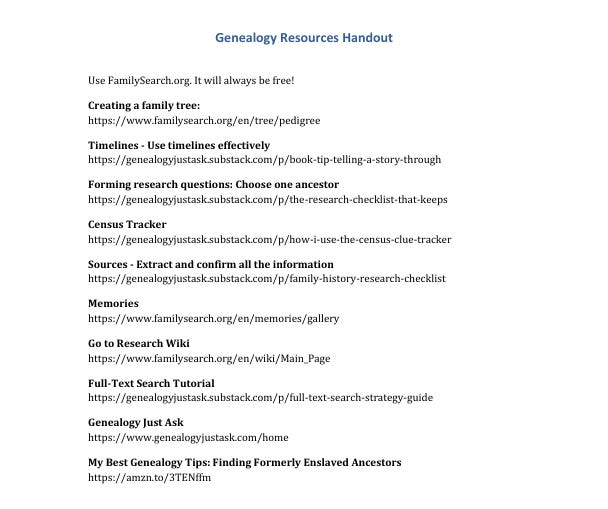
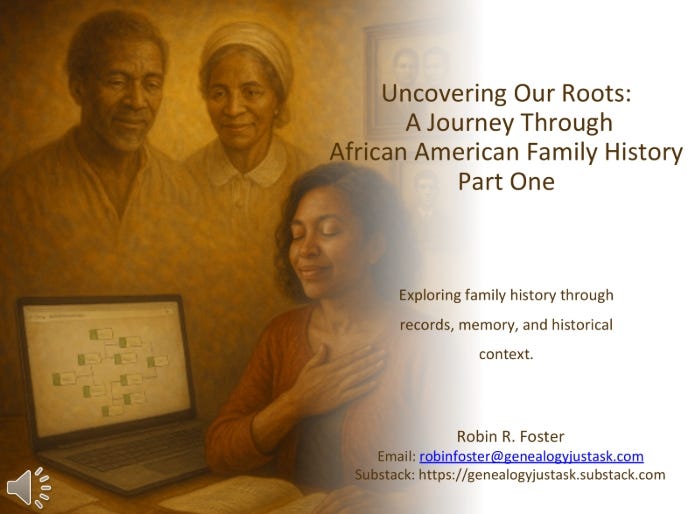
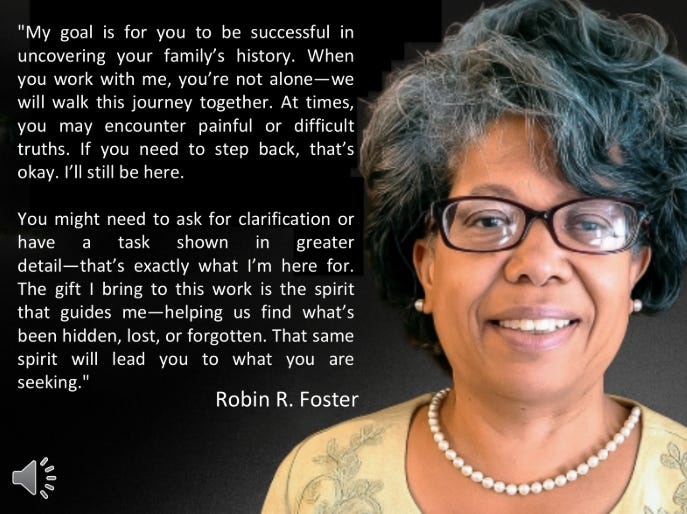







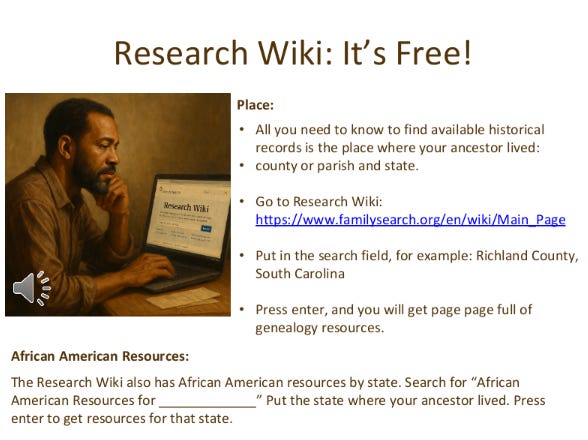

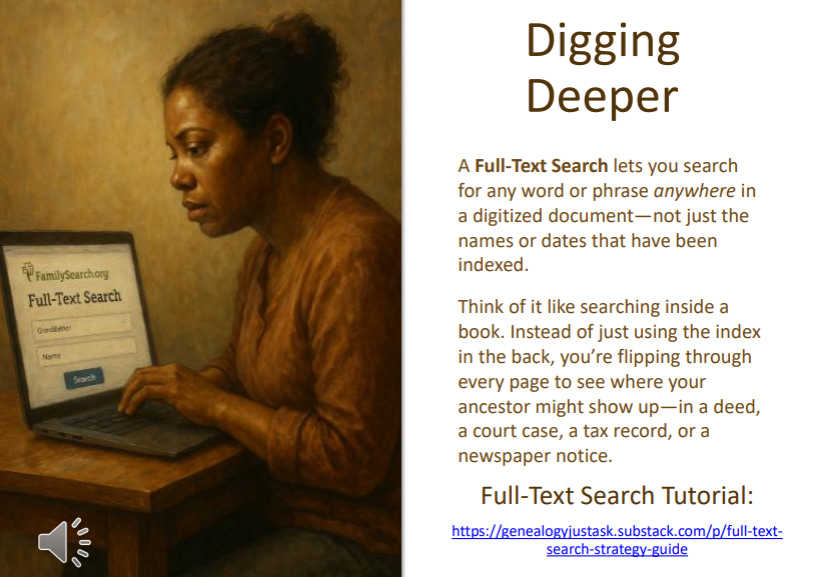








Share this post